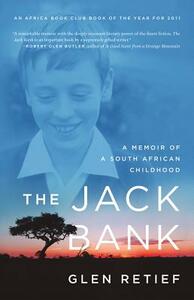Take a photo of a barcode or cover
Though the stories are incredible, the author's sense of vagueness and perpetual questioning of his own life distracts from the events. It is a story mixed with violence and love, where passion is the underlying theme. It seems to be written as a 250 page monologue, which would be much better served if spoken aloud rather than read.
This book is often difficult to read, given the subject matter, but it's beautifully written.
I don't have much experience with memoir, but this one was great. Written by one of my grad school associates and friends, Glen Retief, The Jack Bank tells of his early years in South Africa, in an environment where violence often merges with power and sexuality. Life in an African National Park itself was interesting, but his depiction of the horrors taking place in boarding school was gut-wrenching. The title and back cover only touch on the depth of violence and depravity inflicted upon the lowerclassmen by the seniors late at night when there are no teachers around.
But for me the most interesting part of the book took place toward the end, when as a young gay man in his 20s, Glen lived in Cape Town and dated a man from the ghetto of Soweto, many hours' drive away. Glen has lived a fairly sheltered life (the "Jack Bank" notwithstanding), and has become aware of his privilege and power as a white man, but he is still easily fooled by romanticized notions of how those in poverty live, seeing them as more pure and honest. He moves through the ghetto like a privileged white boy: unaware of danger, unwilling to believe the locals about the reality of the place, and falsely secure in his misunderstanding about his relationships with locals. This all comes crashing down quickly when rivals of the ANC (this was in the early 90s) raid Soweto while Glen is still there.
A great book, which I highly suggest.
But for me the most interesting part of the book took place toward the end, when as a young gay man in his 20s, Glen lived in Cape Town and dated a man from the ghetto of Soweto, many hours' drive away. Glen has lived a fairly sheltered life (the "Jack Bank" notwithstanding), and has become aware of his privilege and power as a white man, but he is still easily fooled by romanticized notions of how those in poverty live, seeing them as more pure and honest. He moves through the ghetto like a privileged white boy: unaware of danger, unwilling to believe the locals about the reality of the place, and falsely secure in his misunderstanding about his relationships with locals. This all comes crashing down quickly when rivals of the ANC (this was in the early 90s) raid Soweto while Glen is still there.
A great book, which I highly suggest.
Combine South Africa, boarding school, and questioning of sexuality -- three book topics that interest me more or less to no end -- and stir. Add a bit of seasoning; stir again. Yay?
What surprised me, I think, was how little the book had to do with the cover copy. I mean, yes, he talks about growing up in a game preserve; he talks about boarding school and the jack bank. But that's more or less where the cover copy ends, leading me to think that that was the focus of the book; as it is, the jack bank is not too much more than an anecdote, and the cover copy only takes us halfway through the book.
Much of my ambivalence about the book, then, stems simply from it not being entirely what I'd expected. The rest stems from a wish that the author had gone deeper. He talks about events, and actions, but stops short of examining what they might mean in a greater context or in terms of himself. Take as an example the titular jack bank: Or, later in the book, race: I'm not fishing for particular answers in either of these cases -- I can just imagine a number of different answers to each and am consequently curious as to which, if any, might be true.
Interesting book. Misleading copy. Not-entirely-fulfilled expectations.
Chatter on the mythical trifecta here.
What surprised me, I think, was how little the book had to do with the cover copy. I mean, yes, he talks about growing up in a game preserve; he talks about boarding school and the jack bank. But that's more or less where the cover copy ends, leading me to think that that was the focus of the book; as it is, the jack bank is not too much more than an anecdote, and the cover copy only takes us halfway through the book.
Much of my ambivalence about the book, then, stems simply from it not being entirely what I'd expected. The rest stems from a wish that the author had gone deeper. He talks about events, and actions, but stops short of examining what they might mean in a greater context or in terms of himself. Take as an example the titular jack bank:
Spoiler
He talks in some depth about how awful the beatings were when he was a young student -- but then mentions, almost as an afterthought, that he beat younger students too when he was a prefect. I would have loved to see him address the questions of why, and whether it troubled him, and so on -- even if he didn't have solid answers.Spoiler
What does it mean to him that he is, or was, primarily attracted to black men?Interesting book. Misleading copy. Not-entirely-fulfilled expectations.
Chatter on the mythical trifecta here.
Loved loved loved it. Beautifully written. Deeply moving.
Read this for school and had the opportunity to meet the writer, a really interesting and bright fellow. To be completely honest, I didn't think I'd be all that crazy about the book, it just didn't sound like my cup of tea. But Retief's journey is fascinating and inspiring, not to mention quite well-written. I especially enjoyed the "Black Boys of My Youth" section. Retief's recollections of his adolescence are both amusing and enlightening. Definitely worth a read.

